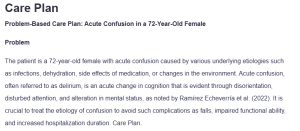Care Plan
Problem-Based Care Plan: Acute Confusion in a 72-Year-Old Female
Problem
The patient is a 72-year-old female with acute confusion caused by various underlying etiologies such as infections, dehydration, side effects of medication, or changes in the environment. Acute confusion, often referred to as delirium, is an acute change in cognition that is evident through disorientation, disturbed attention, and alteration in mental status, as noted by Ramírez Echeverría et al. (2022). It is crucial to treat the etiology of confusion to avoid such complications as falls, impaired functional ability, and increased hospitalization duration: Care Plan.
Broad Goal
The broad purpose of this plan is to decrease acute confusion symptoms and restore the patient to baseline mental function within a week.
SMART Outcomes
- The patient will be better oriented to time, place, and person by the end of the week, answering orientation questions correctly on at least three out of four tests.
- The patient will have coherent conversations with caregivers and family members for at least 10 minutes per session thrice a week.
- By the end of the week, the patient will report a reduction in incidents of confusion, with distress levels at two or below on a scale of 10.
Interventions
Notably, to achieve these outcomes, the cognitive status will be observed daily using tools like the Mini-Mental State Examination (MMSE) to track any change in the patient’s mental status, as Gallegos et al. (2022) asserted. Nutrition and hydration will be monitored regularly since dehydration and malnutrition can exacerbate confusion. There will be a review of medications to determine and alter potentially confusing medications.
The patient’s environment will be adjusted to reduce stressors so the environment is familiar and peaceful. According to Lange and Wioletta Mędrzycka-Dąbrowska (2024), family participation will also be promoted, as it offers emotional support and mental stimulation, which decreases confusion.
References
Gallegos, M., Morgan, M. L., Cervigni, M., Martino, P., Murray, J., Calandra, M., Razumovskiy, A., Caycho-Rodríguez, T., & Gallegos, W. L. A. (2022). 45 Years of the mini-mental state examination (MMSE): A perspective from ibero-america. Dementia & Neuropsychologia, 16(4), 384–387. https://doi.org/10.1590/1980-5764-dn-2021-0097
Lange, S., & Wioletta Mędrzycka-Dąbrowska. (2024). Promoting Family Involvement in the Management of Delirium in Intensive Care: Scoping Review. Medicina, 60(12), 1934–1934. https://doi.org/10.3390/medicina60121934
Ramírez Echeverría, M. de L., Paul, M., & Schoo, C. (2022). Delirium. PubMed; StatPearls Publishing. https://www.ncbi.nlm.nih.gov/books/NBK470399/
ORDER A PLAGIARISM-FREE PAPER HERE
We’ll write everything from scratch
Question 
Create a Problem-based Care Plan for one of the following problems and bring to next class (10 points):
- Acute confusion
- Chronic confusion
- Depression
- Psychosocial needs
- Situational low self esteem
- Memory impairment

Care Plan
Include broad goal, SMART outcomes, and enough interventions to reach the SMART outcomes. The interventions need to be specific to the elderly client in one of the clinical judgment activities discussed in class. 72 YEAR OLD FEMALE
